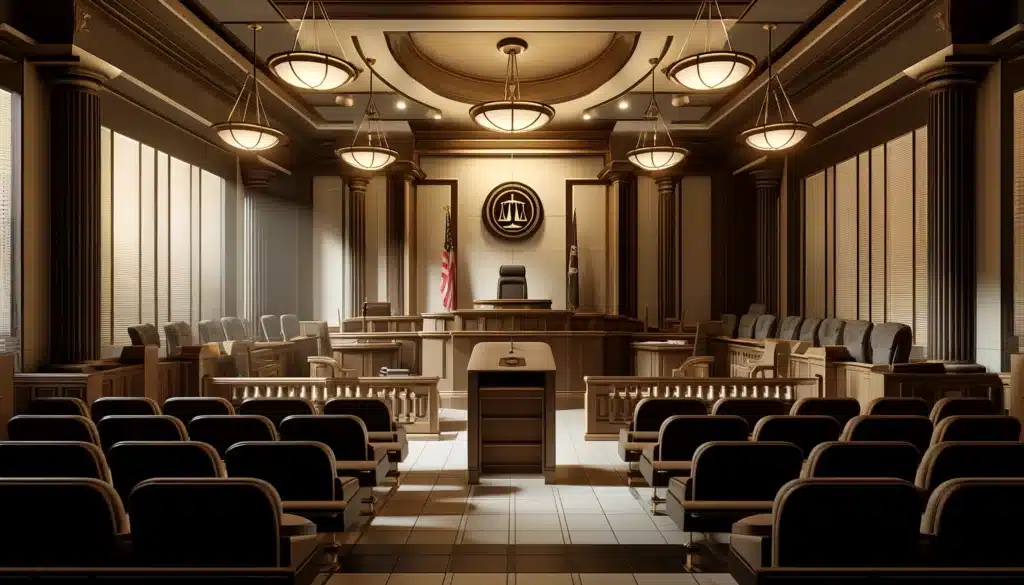If you’re concerned about the prospect of a contentious courtroom battle in your Texas divorce, think again. Contrary to popular belief, the majority of Texas divorces are resolved in a mediator‘s office rather than a courtroom. This may come as a surprise to those who have been regaled with tales of acrimonious divorce proceedings, complete with dramatic courtroom showdowns, from friends and family. So, what does mediation mean for your Texas divorce case? Let’s delve deeper into this pivotal aspect of the divorce process.

Your case might be the rare exception, but generally, most don’t proceed to trial. Chances are, you’ll settle without ever speaking to a judge. The focus here is on avoiding mistakes and problems to reach this outcome. Finding the right attorney requires understanding your goals and what’s best for you. Investing in a family law attorney experienced with clients like you could be the best decision you make.
One of the characteristics that your attorney should embody is a certain degree of experience in helping to select a mediator for their clients. Just what a mediator does and how this person will impact your case is the subject of today’s blog post from the Law Office of Bryan Fagan, PLLC.
Mediation explained
As we just touched on, most divorce cases in Texas settle rather than go to a trial. Most settlements occur in mediation. Whether it is by court order or by mutual agreement, you and your spouse would hire a third-party attorney/mediation to intercede into your case to help you all settle. The mediator can also be selected by the judge if you and your spouse cannot agree on a person.
A mediator is an attorney, and usually, one who is experienced in family law cases. In certain circumstances, your attorney may suggest an ex-judge who heard cases in family law courts. The mediator may have a relationship with your attorney but he or she will not favor you or your spouse. They are neutral and independent. Their role is to help you and your spouse negotiate and settle any outstanding issues in your case. A mediator’s experience trying cases in front of your judge will be important because he or she will be able to give you a neutral opinion on what a judge is likely to do given any individual scenario in your case.

Mediation sessions for most divorces typically last approximately four hours. A full-day session will not be likely but can be done if your case has a particularly large amount of issues. The costs of mediation are split between you and your spouse and are not (usually) included in your attorney’s fees. You will be paying your attorney to be present with you at mediation and will pay the mediator as well. This may seem like a lot of costs, but keep in mind that the alternative is the weeks-long preparation for a trial that could last more than one day.
What the mediator cannot do
The mediator is not there to weigh the strength of your argument and that of your spouse on a particular issue and then make a decision in favor of one of you. They are not an arbitrator, in other words. The mediator is independent and has no force or legitimacy within your case in anything other than helping you and your spouse settle. Their fees do not go up or down depending on whether or not your case settles.
What the mediator does do is be honest with you about the relative strength of your positions. As in, you can expect a mediator to tell you if your argument regarding dividing up the marital assets will either do well or go down in flames with the judge. Before that, the mediator will get a sense of who you are, what your goals are, and what you believe that the mediator needs to know. He or she will then leave the room where you and your attorney are seated and go to the room where your spouse and their attorney are and do the same with them.
Acting like a ping-pong ball, the mediator bounces back and forth between the rooms to communicate settlement offers and help you all problem solve your issues. Unless you give the mediator permission, he or she cannot disclose anything you say in your room to your spouse. For instance, a mediator cannot be called as a witness to tell the judge anything that you or your spouse told him or her during the mediation session.
Where cases go if they don’t settle- trial
In Texas, about 10-20% of divorce cases go to trial. Various factors can prevent a settlement, including difficult circumstances or a belief by one or both spouses that agreement is impossible, significantly increasing the chances of going to trial. Contrary to popular belief shaped by TV and movies, a trial is not a free-for-all drama. In reality, trials are usually private, attended only by the divorcing couple. It’s uncommon for there to be an audience; occasionally, a friend or family member might observe, but this is not frequent.
Your attorney and you likely would have spent a great deal of time preparing for your trial. You and your spouse will testify about issues related to property and your children. There may be other witnesses who will testify for and against you. Evidence will be offered by each attorney and whatever evidence makes it into the record will be available for the judge to weigh when he or she arrives at their decision(s).
At the end of your trial, the judge will issue his or her rulings on all of the issues submitted to the court. Once this happens either your attorney or your spouse will take those orders and put them into a final order called a Final Decree of Divorce. This is an important step because you will want to make sure that everything put into the mediated settlement agreement (MSA) comes out in the Final Decree. If something happens years from now and requires your return to court to hold your spouse responsible for violating the order you will need the relevant order to be clear and otherwise able to be followed.

Prove Up Hearing
Most courts in Texas require that you or your spouse’s attorney a brief, uncontested hearing known as a prove-up hearing with your attorney in front of the judge.
The judge needs to make sure that you understand what you signed your name to. Your attorney will ask you a series of yes/no questions where you will answer each of them “yes.” Once the judge is satisfied that your children are taken care of and all property is divided that needs to be he or she will grant your divorce.
Conclusion
Understanding the role of mediation in a Texas divorce case is crucial for navigating the process effectively. Contrary to common misconceptions, mediation often serves as the primary means of resolving divorce disputes, offering a more amicable and efficient alternative to contentious courtroom battles. By recognizing the significance of mediation and its potential impact on the outcome of their divorce, individuals can approach the process with clarity and confidence, working towards mutually satisfactory resolutions with the guidance of a mediator.
Questions on divorce? Contact the Law Office of Bryan Fagan, PLLC today
If you have any questions about your divorce, then please contact the Law Office of Bryan Fagan, PLLC. We offer free of charge consultations six days a week with one of our licensed family law attorneys. We take a great deal of pride in representing the people who live in our community to achieve whatever goals they may have. It would be an honor to help you and your family do the same. We hope that the past few blog posts on divorce have been interesting and have taught you a thing or two in the process.
Ebook
![Adobe Stock 62844981[2]](https://www.bryanfagan.com/wp-content/uploads/2023/09/AdobeStock_628449812.jpeg) If you want to know more about what you can do, CLICK the button below to get your FREE E-book: “16 Steps to Help You Plan & Prepare for Your Texas Divorce”
If you want to know more about what you can do, CLICK the button below to get your FREE E-book: “16 Steps to Help You Plan & Prepare for Your Texas Divorce”
![Divorce Wasting Assets[4]](https://www.bryanfagan.com/wp-content/uploads/2023/09/Divorce-wasting-assets4.jpeg) If you want to know more about how to prepare, CLICK the button below to get your FREE E-book: “13 Dirty Tricks to Watch Out For in Your Texas Divorce, and How to Counter Them” Today!”
If you want to know more about how to prepare, CLICK the button below to get your FREE E-book: “13 Dirty Tricks to Watch Out For in Your Texas Divorce, and How to Counter Them” Today!”
![Financial Checklist[3]](https://www.bryanfagan.com/wp-content/uploads/2023/09/financial-checklist3.jpeg) Get this FREE download about what you need to know before filing for divorce.
Get this FREE download about what you need to know before filing for divorce.
Other Articles you may be interested in regarding Houston Court Local Rules:
- Texas Family Law Courts: Mediation and Divorce Essentials
- Texas Family Law Courts: What to Expect
- Harris County, Texas Family Law Court – 245TH Judicial District Local Rules
- 247TH Judicial District Local Rules
- 246TH Judicial District Local Rules
- Harris County, Texas Family Law Court – 308TH Judicial District Local Rules
- Harris County, Texas Family Law Court – 257TH Judicial District Local Rules
- Why is Separate Property Important and How to Keep it Separate in a Texas Divorce?
- What Wikipedia Can’t Tell you About Texas Divorce and Marital Property Division
- Texas Divorce Property Division Enforcement
- Separate Property in a Texas Divorce?
- Does it Matter Whose Name is on the Title or Deed of Property in a Divorce in Texas?
- Is Social Security Considered Separate Property in a Texas Divorce
Frequently Asked Questions
What happens during mediation in a divorce in Texas?
How long does mediation take for divorce in Texas?
What to expect in mediation Texas?
What are the disadvantages of divorce mediation?
Who pays for mediation in divorce in Texas?
How much does divorce mediation cost in Texas?
What are the rules of mediation in Texas?
Is mediation mandatory in Texas divorce?
Law Office of Bryan Fagan, PLLC | Houston, Texas Divorce Lawyers
The Law Office of Bryan Fagan, PLLC routinely handles matters that affect children and families. If you have questions regarding divorce, it’s important to speak with one of our Houston, TX Divorce Lawyers right away to protect your rights.
Our divorce lawyers in Houston TX are skilled at listening to your goals during this trying process and developing a strategy to meet those goals. Contact the Law Office of Bryan Fagan, PLLC by calling (281) 810-9760 or submit your contact information in our online form. The Law Office of Bryan Fagan, PLLC handles Divorce cases in Houston, Texas, Cypress, Klein, Humble, Kingwood, Tomball, The Woodlands, Houston, the FM 1960 area, and surrounding areas, including Harris County, Montgomery County, Liberty County, Chambers County, Galveston County, Brazoria County, Fort Bend County, and Waller County.
Bryan Fagan, a native of Atascocita, Texas, is a dedicated family law attorney inspired by John Grisham’s “The Pelican Brief.” He is the first lawyer in his family, which includes two adopted brothers. Bryan’s commitment to family is personal and professional; he cared for his grandmother with Alzheimer’s while completing his degree and attended the South Texas College of Law at night.
Married with three children, Bryan’s personal experiences enrich his understanding of family dynamics, which is central to his legal practice. He specializes in family law, offering innovative and efficient legal services. A certified member of the College of the State Bar of Texas, Bryan is part of an elite group of legal professionals committed to ongoing education and high-level expertise.
His legal practice covers divorce, custody disputes, property disputes, adoption, paternity, and mediation. Bryan is also experienced in drafting marital property agreements. He leads a team dedicated to complex family law cases and protecting families from false CPS allegations.
Based in Houston, Bryan is active in the Houston Family Law Sector of the Houston Bar Association and various family law groups in Texas. His deep understanding of family values and his professional dedication make him a compassionate advocate for families navigating Texas family law.




